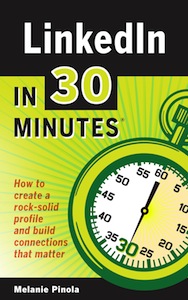 The experimentation continues. Last week, I launched a new marketing and sales experiment for LinkedIn In 30 Minutes, a LinkedIn book for newbies. It involves bulk sales of the paperback to a special audience segment: Career services offices of colleges and universities in the United States.
The experimentation continues. Last week, I launched a new marketing and sales experiment for LinkedIn In 30 Minutes, a LinkedIn book for newbies. It involves bulk sales of the paperback to a special audience segment: Career services offices of colleges and universities in the United States.
My hypothesis: Staff at career services offices of colleges and universities directly serve an audience we are already targeting: People who need to know how to improve LinkedIn profiles in preparation for a job search. Students and recent grads may not have much professional experience to begin with, or in the case of graduate students, they may have career gaps because they have been out of the workforce for several years. They want to present themselves in the best possible light to potential employers and LinkedIn recruiters, and having a rock-solid LinkedIn profile is critical. These are the types of readers we want for LinkedIn In 30 Minutes!
But the problem is: They may not know about the guide, or may not be looking for this type of guide. How can we reach them?
The bulk order pitch to career services offices
I decided to reach out to a few career services offices at universities, ranging from smaller schools such as Suffolk University in Boston to larger schools such as the University of Texas system. I found the contact information of some schools on the Web, and crafted a simple email pitch. Here are the elements:
- I am the publisher, and we have a new book. Here is a PDF sample to download for your personal review
- I would be happy to mail you a paperback copy. Just say the word.
- Here are some specific lessons that will help your students use LinkedIn
- Find out more on the book website
- We can also arrange for bulk orders
I was most interested in the response rate for the paperback book. If they asked for one, I figured that would indicate a strong interest for a bulk purchase. So, I set up some bulk purchase options for LinkedIn In 30 Minutes. Of the 5% who responded with a request for the paperback, I mailed them a copy with a cover letter outlining the bulk prices. So far, no one has indicated they want to purchase a bulk order, but I will follow up with a call next week (Update: three bulk sales so far!). I’m really interested in finding out whether the guide meets their needs, and if so, what sort of bulk purchase terms would be most suitable — for instance, payment by credit card or invoice, the size of the bulk order, etc.
